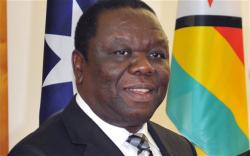
Published date
11 February 2009
Morgan Tsvangirai was sworn in as Prime Minister of Zimbabwe on 11 February 2009 as part of what was known as The Unity Government, in partnership with Robert Mugabe as president. This was considered a positive development in the country, which had experienced tremendous social, political, and economic upheaval. This development happened largely through South African diplomatic efforts. Executive authority was shared between President Robert Mugabe, Prime Minister Morgan Tsvangirai, and the cabinet, with the Zimbabwe African National Union-Patriotic Front (ZANU-PF) and the Movement for Democratic Change – Tsvangirai (MDC-T) sharing portfolio ministries.
The downturn to Zimbabwe's fortunes can be traced back to the Lancaster agreements in which Britain, as the former colonial power, agreed to pay for the reacquisition of land held by British settlers. The British, however, went back on this agreement, as it has been speculated that the Zimbabwean President refused to allow this to be used to exercise undue control over the State of Zimbabwe. Even after independence, the majority of arable land remained in the hands of White Settler farmers. With no means to finance his land reform policies, Mugabe's supporters then went about forcefully occupying the land.
The issue of land in Zimbabwe led to many of its difficulties, internally and internationally. After much social upheaval, with many Zimbabweans fleeing to neighbouring countries, the dominant Zanu-PF party and MDC-T under Tsvangirai agreed to share power in a multi-party government.
The downturn to Zimbabwe's fortunes can be traced back to the Lancaster agreements in which Britain, as the former colonial power, agreed to pay for the reacquisition of land held by British settlers. The British, however, went back on this agreement, as it has been speculated that the Zimbabwean President refused to allow this to be used to exercise undue control over the State of Zimbabwe. Even after independence, the majority of arable land remained in the hands of White Settler farmers. With no means to finance his land reform policies, Mugabe's supporters then went about forcefully occupying the land.
The issue of land in Zimbabwe led to many of its difficulties, internally and internationally. After much social upheaval, with many Zimbabweans fleeing to neighbouring countries, the dominant Zanu-PF party and MDC-T under Tsvangirai agreed to share power in a multi-party government.
References
BBC News," Tsvangirai becomes Zimbabwe's PM. ", From:BBC News [Online] at: news.bbc.co.uk [accessed 01 February 2010]|
New York Times,"Robert Mugabe. ",From:New York Times [Online] at: topics.nytimes.com[accessed 01 February 2010]|Washington Post,"Tsvangirai Begins Term as Premier. ",From:The Washington Post [Online] at: .washingtonpost.com [accessed 01 February 2010]